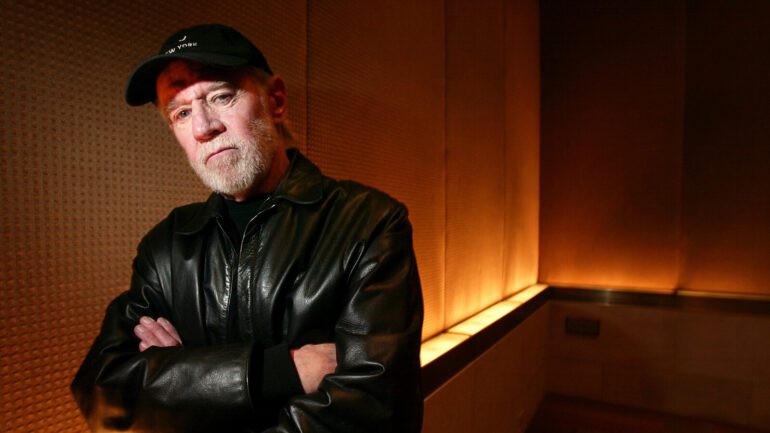TL;DR:
- George Carlin’s estate files a lawsuit against podcast hosts Chad Kultgen and Will Sasso for using AI to create an impersonation of Carlin.
- The lawsuit alleges copyright infringement, claiming that the AI-generated content tarnishes Carlin’s comedic legacy.
- This case highlights the growing legal challenges surrounding AI and copyright law, with other notable figures and publications taking similar actions.
- Carlin’s daughter expresses her displeasure, emphasizing the need to protect her late father’s comedic material.
- The lawsuit raises questions about the use of AI in creative endeavors and the evolving boundaries of intellectual property rights.
Main AI News:
In a significant legal showdown, the estate of the legendary comedian George Carlin has filed a lawsuit against podcast hosts Chad Kultgen and Will Sasso, alleging copyright infringement over their use of artificial intelligence to produce a “ghoulish” impersonation of Carlin for a comedy episode. This dispute raises crucial questions about the intersection of AI, copyright law, and creative ethics.
The lawsuit, recently filed in California, contends that Kultgen and Sasso utilized Carlin’s extensive body of work to train an AI program, resulting in an AI-generated “George Carlin Special” featured on the Dudesy podcast. The estate asserts that this digital impersonation tarnishes Carlin’s comedic legacy and damages his reputation, characterizing it as “computer-generated clickbait.”
This legal battle adds to the growing number of cases involving AI and copyright infringement. Comedian Sarah Silverman, author George R.R. Martin, and renowned publications like The New York Times have all taken legal action against tech companies accused of exploiting their creations without authorization for AI training purposes.
The contentious Dudesy special, titled “George Carlin: I’m Glad I’m Dead,” opens with a Carlin-esque voice humorously stating, “I’m sorry it took me so long to come out with new material, but I do have a pretty good excuse. I was dead.” Throughout the episode, the AI character reflects on contemporary American cultural phenomena, such as Taylor Swift, gun culture, and the role of artificial intelligence in society.
In an emotional interview with CBC’s As It Happens, Carlin’s daughter expressed her dismay over the podcasters’ failure to seek her family’s consent or approval for using her father’s likeness. Kelly Carlin-McCall condemned the AI-generated voice, describing it as “ghoulish” and “creepy.” She urged the podcast hosts to apologize and remove the content, emphasizing her desire to protect her late father’s legacy and his unique comedic creations.
The Dudesy podcast, hosted by Sasso and Kultgen, introduces an artificial intelligence personality named Dudesy, who actively engages with the human hosts throughout the show. In the lawsuit, Carlin’s estate alleges that the podcast made unauthorized reproductions of Carlin’s copyrighted material to train Dudesy for the hour-long special. Additionally, it accuses the podcast of employing Carlin’s name and likeness without proper authorization, even in Instagram posts promoting the controversial episode.
The legal landscape surrounding AI and creative expression remains largely uncharted territory. While impersonations and mimicry have historically been permissible under copyright law, the emergence of highly convincing AI systems challenges traditional boundaries. The extent to which such AI-generated content is legally acceptable remains uncertain, leading to a slew of unresolved questions in the realm of intellectual property.
Experts in the field, like Ryan Abbott from the Los Angeles-based law firm Brown Neri Smith & Khan, acknowledge that the law is struggling to keep pace with the rapid advancements in AI technology. “Because this is so new, courts haven’t weighed in yet on the degree to which these things are permissible,” Abbott stated. As a result, a cloud of legal uncertainty looms over the use of AI in creative endeavors.
Sasso and Kultgen have refrained from disclosing the identity of the company responsible for creating Dudesy, citing a non-disclosure agreement. This legal battle between Carlin’s estate and the podcast hosts promises to be a protracted and consequential one, as it forces us to grapple with the complex intersection of technology, creativity, and intellectual property rights.
George Carlin, an iconic comedian who captivated audiences with his provocative counter-culture standup routines over a career spanning half a century, left an indelible mark on the entertainment industry. Honored with a star on the Hollywood Walk of Fame and a frequent guest on The Tonight Show, Carlin was the recipient of four Grammy Awards for his contributions to comedy. His untimely passing due to heart failure in 2008 marked the end of an era in comedy, but his legacy continues to inspire and challenge the boundaries of creativity and humor.
Conclusion:
This legal battle underscores the complex and evolving relationship between AI, creativity, and intellectual property rights. It highlights the need for clearer regulations and guidelines in the face of rapidly advancing AI technology, which has the potential to reshape the creative landscape. As AI-generated content becomes more convincing, legal uncertainties persist, posing challenges for content creators and copyright holders in the market.

